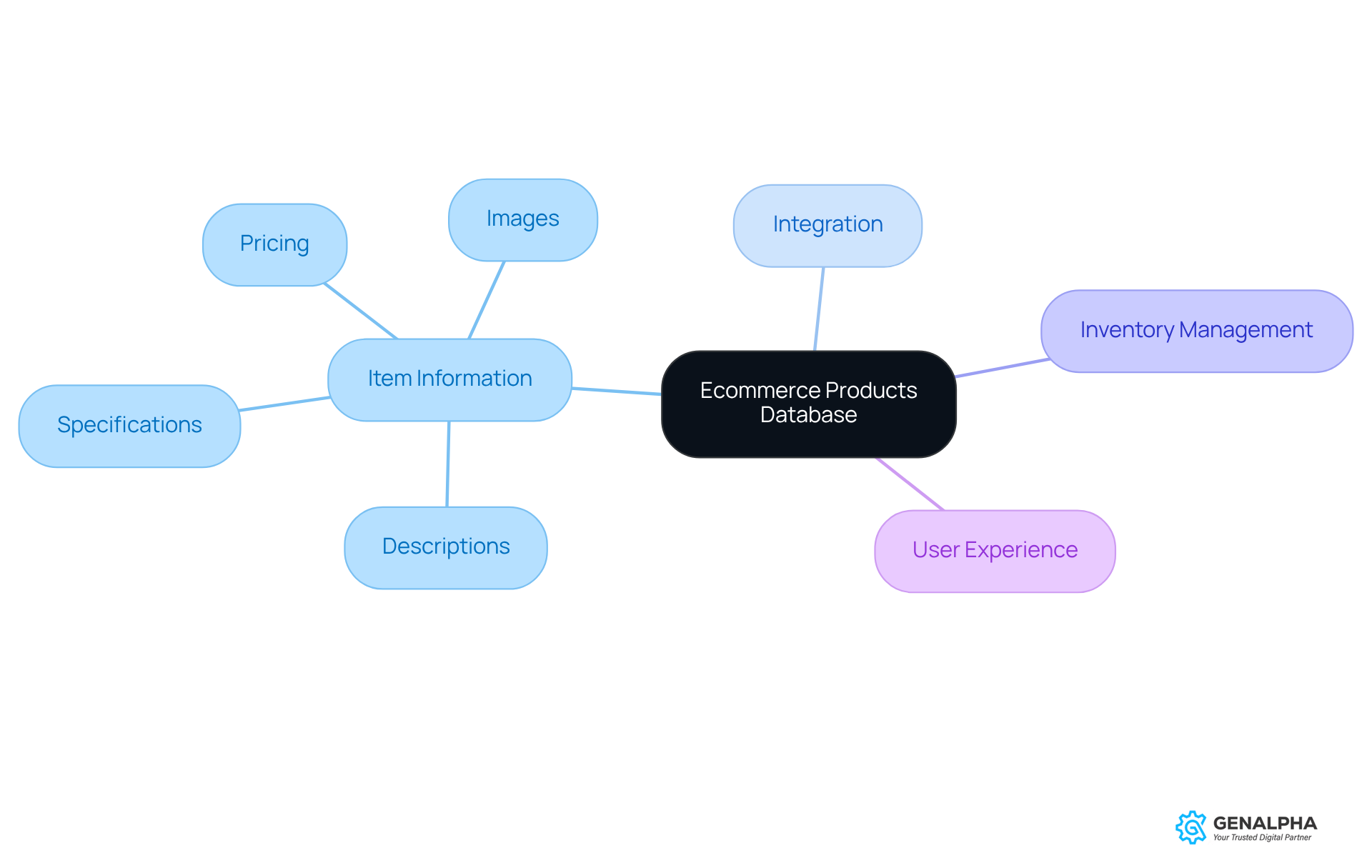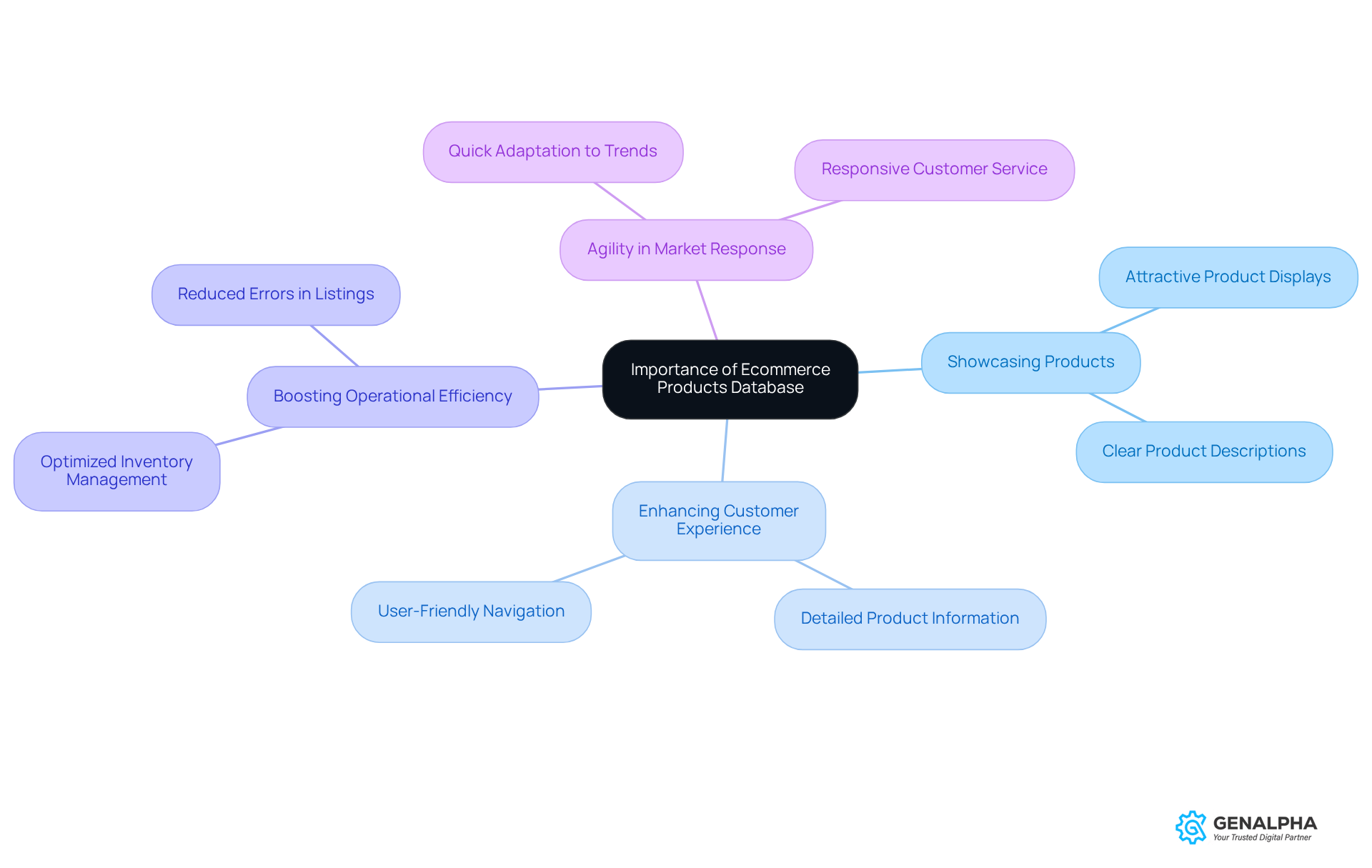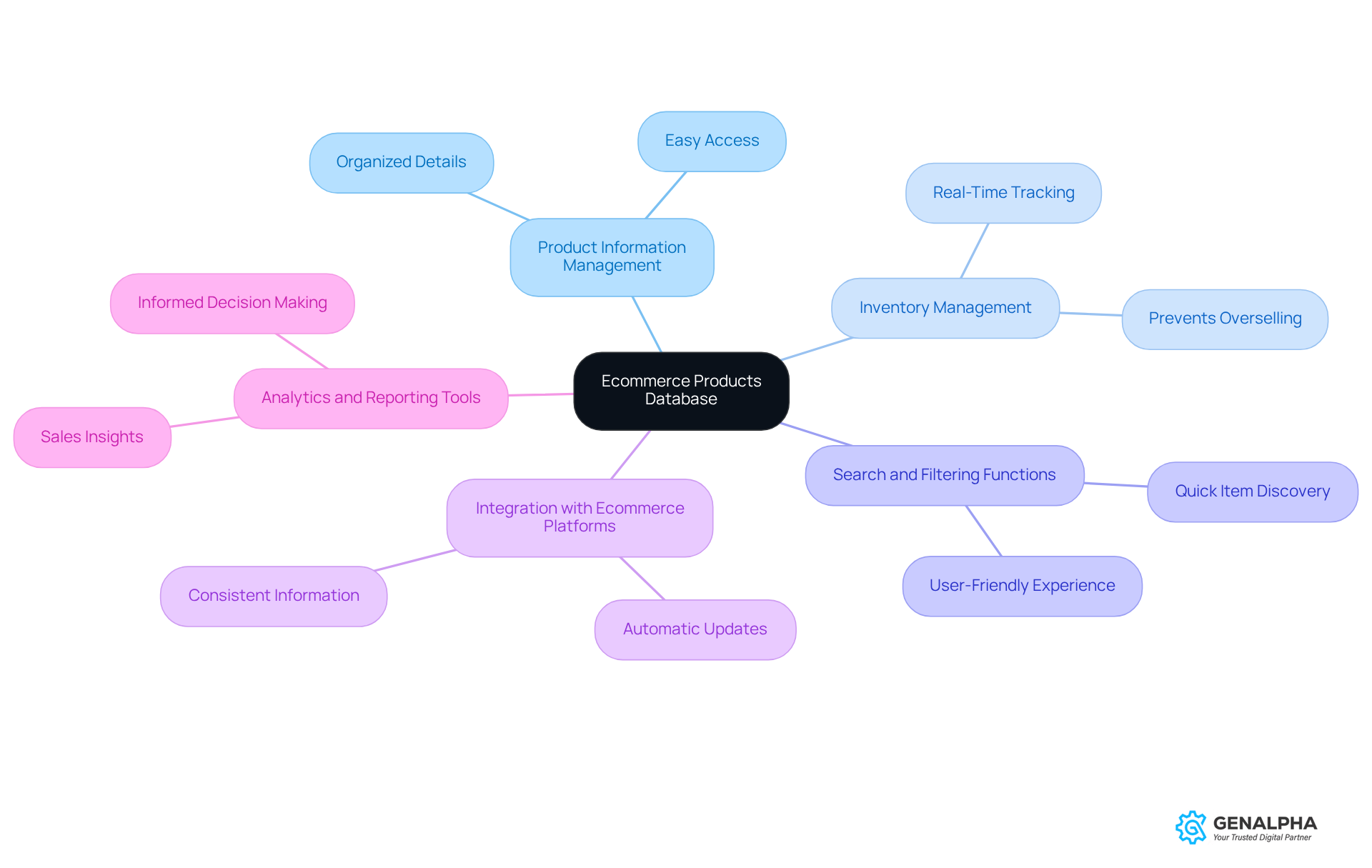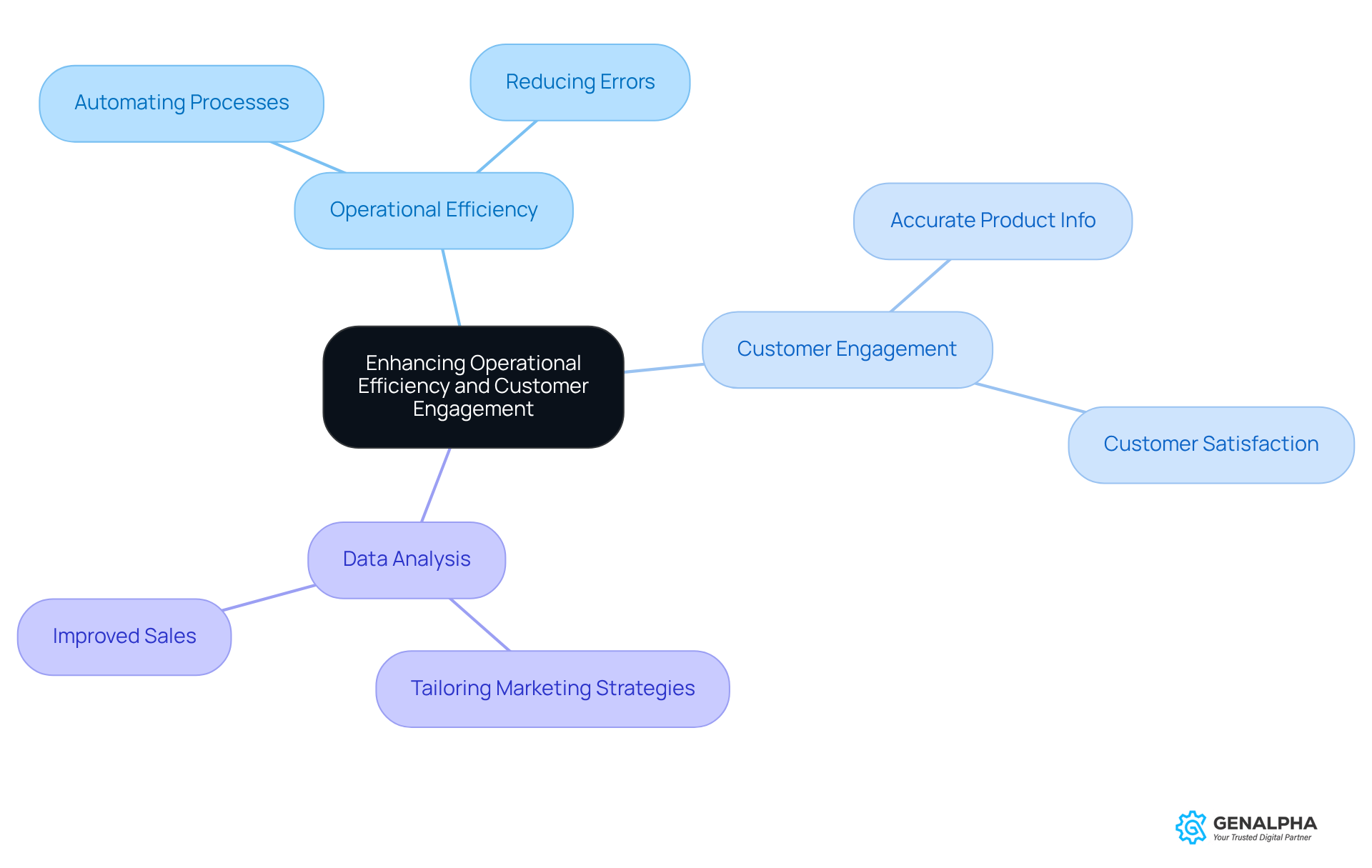Overview
Have you ever wondered how online stores keep track of all their products? Well, an ecommerce products database is the secret sauce! It’s a centralized system that organizes everything from product descriptions to pricing and inventory levels. For manufacturers in the digital marketplace, this database is absolutely essential.
Not only does it improve the customer experience by providing accurate information, but it also boosts operational efficiency. Imagine being able to respond quickly to market demands—that’s what this database allows manufacturers to do! And when they can do that, it leads to increased sales and stronger customer loyalty.
So, if you’re in the manufacturing game, consider how a well-managed products database could transform your business. It’s all about making things easier for you and your customers. What do you think? Could this be the game-changer you’ve been looking for?
Introduction
An ecommerce products database is like the backbone of online retail, bringing together all the essential info about products and making it super easy for customers to find accurate details.
Think about it: for manufacturers, this system not only simplifies inventory management but also boosts customer experience by offering clear and organized product information.
But here’s the kicker— with the digital landscape constantly changing, how can manufacturers tap into this powerful tool to not just keep up, but really shine in a crowded market?
Let's explore!
Define Ecommerce Products Database
Have you ever wondered how online stores keep track of all those products? Well, an ecommerce products database serves as a central hub that holds all the essential details about items available for purchase online. Think of it as a digital filing cabinet that includes everything from item descriptions and specifications to pricing, inventory levels, and even images.
For manufacturers and distributors, this system is crucial. It’s the backbone of their online sales activities, helping them manage item information effectively. This way, customers can easily access accurate and up-to-date details from the ecommerce products database when they are ready to make a purchase. Imagine browsing a site and finding exactly what you need without any confusion—that’s the power of a well-organized inventory system!
Additionally, these systems can seamlessly integrate with various components of the ecommerce products database. This means updates and synchronization of item information happen effortlessly across multiple sales channels. So, whether you’re shopping on your phone or laptop, you can trust that the information is current.
Isn’t it amazing how technology makes shopping easier for all of us? If you’re in the business of selling online, investing in a solid inventory system could be a game-changer for you!

Importance for Manufacturers in the Digital Landscape
In our digital world, having a solid ecommerce products database is a game changer for manufacturers. Think about it: how can you showcase your products in a way that grabs the attention of potential clients? It’s all about making your offerings clear and appealing, especially when the competition is fierce. With online shopping booming, it’s crucial for manufacturers to ensure that their product details are easily accessible in the ecommerce products database.
A well-managed information system does wonders. Not only does it enhance the customer experience by providing detailed product information from the ecommerce products database, but it also boosts operational efficiency. Imagine optimizing your inventory management and cutting down on errors in product listings! Plus, it gives manufacturers the agility to respond quickly to market changes and customer needs. This responsiveness can lead to increased sales and stronger customer loyalty.
So, how can you make sure your inventory system is up to par? Let’s dive into the details and explore how you can elevate your ecommerce game!

Key Features and Components of an Ecommerce Products Database
When considering an effective ecommerce products database, what comes to mind? It’s not just about having a list of items; it’s about creating a seamless experience for both sellers and buyers. Here are some key features that really make a difference:
- Product Information Management: Imagine having all your product details—descriptions, specs, and images—neatly organized in one place. It makes life so much easier!
- Inventory Management: Nobody likes to see that dreaded ‘out of stock’ message. Real-time tracking helps prevent overselling and ensures you always have what your customers want.
- Search and Filtering Functions: Ever spent ages looking for something online? Sophisticated search features let users find items quickly based on various criteria, making shopping a breeze.
- Integration with Ecommerce Platforms: Keeping item information consistent across all sales channels is crucial. Seamless connectivity with ecommerce platforms ensures that updates happen automatically.
- Analytics and Reporting Tools: Want to know how your products are performing? These tools provide insights into sales trends and customer behavior, helping you make informed decisions.
Together, these components create a robust system that enhances the overall experience of the ecommerce products database. So, what do you think? Ready to take your ecommerce game to the next level?

Enhancing Operational Efficiency and Customer Engagement
Imagine running an ecommerce business where everything just clicks. A well-executed ecommerce products database can make that dream a reality! By automating processes like inventory updates and managing item details, you not only boost operational efficiency but also cut down on those pesky human errors. This means your team can focus on the big picture instead of getting bogged down in the details.
But that’s not all! When manufacturers provide clients with accurate and comprehensive information about their products, it really enhances customer engagement and satisfaction. Think about it: when customers can easily find what they need, they’re way more likely to complete their purchases.
Additionally, having the ability to analyze how customers interact with your database opens up a world of possibilities. It allows manufacturers to tailor their marketing strategies and product offerings, which can lead to increased sales and stronger relationships with customers. So, why not take a closer look at how an ecommerce products database could transform your business? It might just be the game-changer you’ve been looking for!

Conclusion
An ecommerce products database is more than just a tech tool; it’s a game changer for manufacturers. Think about it: this system centralizes all the essential product information, making online sales a breeze. Not only does it simplify managing product details, but it also ensures customers can easily find accurate and up-to-date info, which really enhances their shopping experience. A well-organized database can be a major factor in a manufacturer’s success in today’s competitive digital marketplace.
Throughout this article, we’ve seen how crucial a robust ecommerce products database is. From boosting operational efficiency with automated inventory management to engaging customers with detailed product info, the benefits are crystal clear. Features like real-time tracking, seamless integration with ecommerce platforms, and analytical tools give manufacturers the resources they need to adapt quickly to market demands and customer preferences.
So, why should manufacturers embrace an effective ecommerce products database? It’s not just about upgrading technology; it’s a strategic move that can completely change how they connect with their customers. By investing in this essential tool, manufacturers can streamline their operations and build stronger relationships with clients, leading to increased sales and loyalty. The digital landscape is full of opportunities, and leveraging a well-structured ecommerce products database could be the key to unlocking a brighter future in online retail.
Are you ready to take that step? Let’s make the most of what this technology has to offer!
Frequently Asked Questions
What is an ecommerce products database?
An ecommerce products database is a central hub that holds essential details about items available for purchase online, including item descriptions, specifications, pricing, inventory levels, and images.
Why is an ecommerce products database important for manufacturers and distributors?
It is crucial for manufacturers and distributors as it serves as the backbone of their online sales activities, helping them manage item information effectively and ensuring customers can access accurate and up-to-date details when making a purchase.
How does an ecommerce products database improve the shopping experience?
A well-organized ecommerce products database allows customers to browse online stores and find exactly what they need without confusion, enhancing the overall shopping experience.
Can ecommerce products databases integrate with other systems?
Yes, these systems can seamlessly integrate with various components, allowing for effortless updates and synchronization of item information across multiple sales channels.
How does technology impact online shopping through ecommerce products databases?
Technology makes shopping easier by ensuring that information is current and accessible, whether customers are shopping on their phones or laptops.




